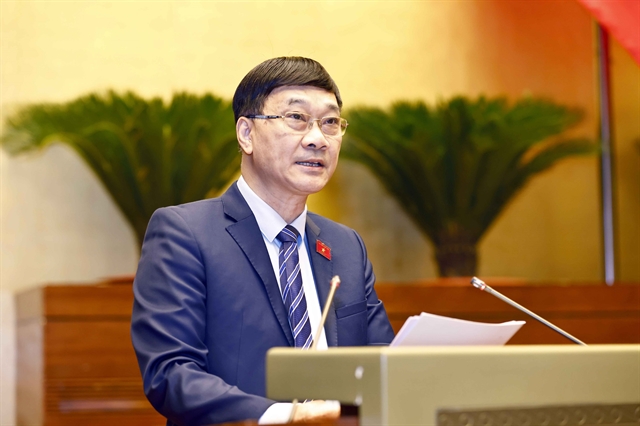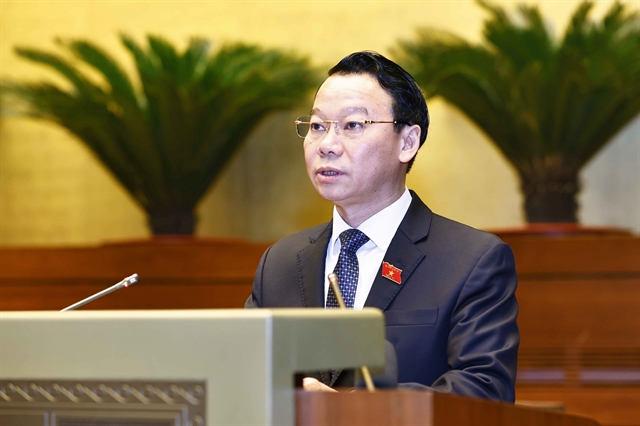 Politics & Law
Politics & Law

 |
| Chairman of the NA’s Committee for Economic Affairs Vũ Hồng Thanh presents the appraisal report on the investment proposal for the North-South high-speed railway project. — VNA/VNS Photos Doãn Tuấn |
HÀ NỘI — The National Assembly has been considering an investment proposal for the North-South high-speed railway, a project aimed at transforming transport infrastructure and boosting socio-economic development.
Transport Minister Nguyễn Văn Thắng, on behalf of the Prime Minister, presented the proposal on Wednesday, highlighting its goals to meet increasing transport demands, restructure the north to south corridor, and reinforce national security.
The proposed 1,541km electrified twin-track railway will feature a 1,435mm gauge, a design speed of 350km per hour and 23 passenger stations.
Approved by all 20 affected provinces, the route will span from Hà Nội to HCM City, connecting urban centres and development zones across key regions.
The timeline has been set for late 2024 for parliamentary approval, with feasibility studies planned for 2025-26 and ground-breaking construction to start in 2027.
The estimated project cost is VNĐ1.7 quadrillion (US$67.34 billion), with an expected 33-year return on investment.
To advance the project smoothly, 19 special policy provisions are being proposed.
Chairman of the NA’s Committee for Economic Affairs Vũ Hồng Thanh expressed the committee’s support, but requested a more accurate forecast of transport demand and careful budget planning to align with national debt safety limits.
The committee recommended optimising connections between the new railway and the national and regional transport networks, including urban and international rail systems.
It also advised the government to clarify staged investment phases and associated funding requirements.
The committee suggested rigorous assessments of the project’s fiscal impact to safeguard macroeconomic stability.
 |
| Minister of Natural Resources and Environment Đỗ Đức Duy presents the draft resolution on piloting commercial housing projects through land-use transfer agreements. |
Continuing the session agenda, Minister of Natural Resources and Environment Đỗ Đức Duy presented a draft resolution to the NA to pilot a new approach for commercial housing projects based on agreements for transferring or using existing land-use rights.
According to minister Duy, the draft resolution seeks to alleviate persistent supply shortages in real estate, which have partly driven property prices upward.
By expanding conditions for transferring land-use rights for commercial housing projects, the proposed resolution aims to make land access easier for investors, reduce public grievances, ensure fairer land access across regions, stabilise commercial housing supply and promote a more transparent and healthy real estate market.
The resolution, if adopted, would apply nationwide to real estate businesses undertaking land-use rights transfers, ownership, or a combination of both. It would also apply to commercial housing projects on sites where existing facilities need relocation due to pollution or urban planning.
For investors, eligible projects could be carried out on agricultural land, non-residential non-agricultural land, residential land or mixed-use plots agreed upon through land-use transfer arrangements.
Key requirements for these projects include alignment with district land-use plans or urban planning regulations, adherence to local housing development programmes approved by authorities and provincial-level consent allowing real estate businesses to acquire land-use rights.
For projects involving land under defence or security, approval from the Ministry of Defence or the Ministry of Public Security would be required to ensure compatibility with approved housing development land-use plans.
Real estate businesses must also meet all legal requirements on land, housing, real estate business, investment and other related regulations.
In its review of the draft resolution, the Committee for Economic Affairs, chaired by Thanh, supported the government’s pilot, noting that it aligns with Resolution No. 18-NQ/TW, which promotes market-based agreements between citizens and businesses for urban and commercial housing projects.
The concept has already received high-level approval.
However, some voices have raised concerns, warning that the pilot programme’s impact could be far-reaching, potentially resulting in long-term consequences that may affect the interests of citizens and investors alike.
Given the potentially broad scope of land types included in the pilot, the Economic Committee recommended specific consideration be given for land designated for agriculture and forestry.
The committee further advised a thorough review of the pilot’s application, suggesting an evaluation of whether the draft resolution should apply universally or only to land-use agreements established after its effective date. — VNS




